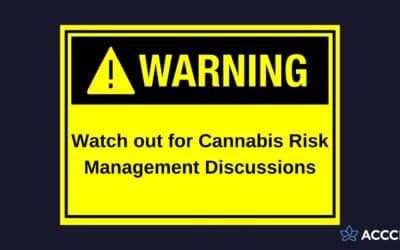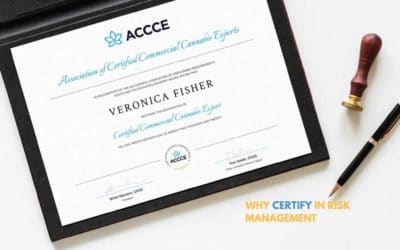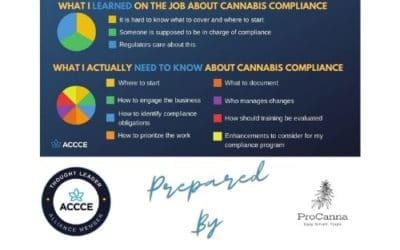Executive and director roles for compliance and risk management are consistently found in highly regulated industries such as pharmaceutical, financial services, alcohol, tobacco, and publicly traded companies. As the commercial cannabis industry matures, similar roles are forming, but the roles are at different levels of maturity between commercial cannabis businesses and other highly regulated industries, and that is OK. Understanding why varying degrees of maturity in risk management are acceptable between industries is helpful.
Cannabis Risk Management Framework
How to Establish an Effective Cannabis Compliance Program
When an inspector finds a deficiency or violation, how do they decide the appropriate level of punishment? While there is no standard across all states, many agencies take intent into account. Regulators evaluate the company’s compliance program—if there is one—and determine if it’s an active program or merely a paper program designed to assuage external stakeholders.
Why Certify in Risk Management
Why do I want my compliance and risk officer(s) to achieve a risk management certification?
A certified compliance officer is better equipped to effectively develop a comprehensive plan to achieve your business objectives. They are trained to spot high-risk activity prior to non-compliance or misconduct. They are better able to understand how to enable all employees to make informed risk-based decisions.
Checks and Balances: Reducing Operational Risk in Commercial Cannabis
Operators must not only manage the day-to-day challenges unique to the industry, but they must also find ways to improve performance while reducing costs if they wish to remain competitive. While profitability and market share are the ultimate goal, maintaining compliance in an ever-changing regulatory environment puts additional pressure on companies looking to carve out their piece of the pie. Unfortunately, the pursuit of profits and the desire for a competitive advantage can sometimes lead to hasty decisions that result in unnecessary operational risk. The good news is that with the proper planning, processes, and systems in place, managers and executives can significantly reduce the operational risk associated with their business.
Risk Officers Support the Board
How does a Risk Officer help company Directors understand the risks to the business? The role of the risk officer is a trusted advisor to keep the board informed of risks so the directors can make reasonably informed decisions. Risk officers provide information to the board on many topics, including information needed to execute their duties as outlined in their job description, challenge management assumptions, advise management on strategy, build value, ensure leadership, and understand regulatory complexities of corporate transactions.
10 Steps for an Effective Cannabis Compliance Program
Like most things in life, you can think of risk management and compliance on a spectrum. We have three basic areas of the spectrum. In the middle, we find most operators who want to avoid deficiency notices, fines, and enforcement. They’re interested in managing risk and compliance, but may not have spent the time or resources to master the process. For all of you who are looking to develop and implement a compliance program or seek to improve the program you already have, this article is for you.
How can I interview a compliance or risk officer and figure out if they are the right candidate?
How can I interview a compliance or risk officer and figure out if they are the right candidate?
Ask these 3 questions: How will you protect our business? How will you enable others to do their jobs? How will I know if you will implement a risk strategy that works for my business?
Comply or Go Awry: Highlights From a Commercial Cannabis Enforcement Action and How to Protect Your Business
Commercial cannabis businesses tend to focus on preserving compliance with regulations in order to satisfy licensing requirements; however, managing risk holistically involves more than looking at the regulations.
Read this real-world case study of a commercial cannabis enforcement action and learn how to protect your business from potential penalties.
Form 8300 – Do You Have Another IRS Issue?
In the United States of America, commercial cannabis businesses must be aware of the Internal Revenue Service (IRS) requirements for Form 8300 when receiving over $10,000 in cash for a single or related transaction. To reduce your civil and criminal risk exposure, start your risk-based approach to Form 8300 compliance today with a risk assessment, system of control, and looking at the past.
Protect Your Company from Compliance Enforcement Actions
Compliance enforcement actions have long been used by regulators to push a licensee to comply and when severe enough, can be detrimental to the future success of a business. Commercial cannabis businesses may suffer disruptions in supply chain, loss of reputation and revenue among other things. A formalized risk program denotes a commitment to compliance and is strong evidence that the company did everything it could do to prevent non-compliance.










